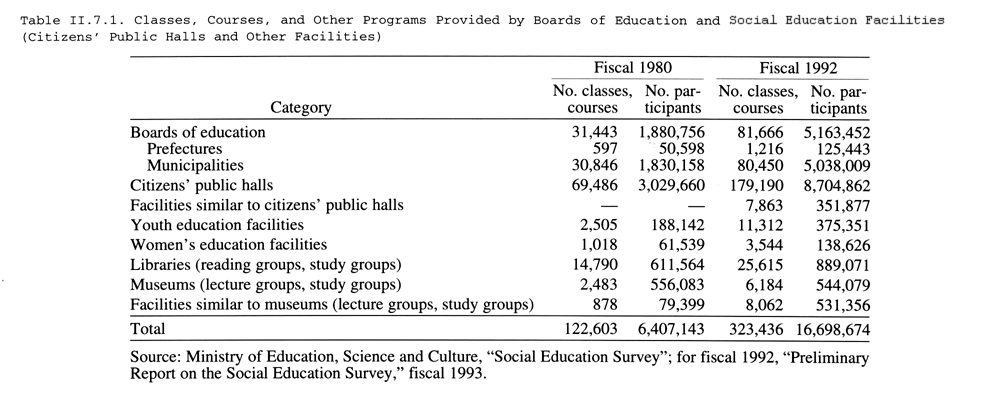| Home > Policy > White Paper, Notice, Announcement > White Paper > JAPANESE GOVERMENT POLICICIES IN EDUCATION, SCIENCE AND CULTURE 1994 > PART II Chapter 7 Section 2 1 | ||
Social change and the diversification of personal value systems and lifestyles have led to an upsurge of adult learning activities. Classes, courses, and other programs organized by the boards of education of local governments play an important role in the provision of learning opportunities ( Table II.7.1 ).
The Ministry of Education, Science and Culture subsidizes classes, courses, and other programs provided by municipalities as part of its commitment to the provision of learning opportunities in fields relating to community learning issues and contemporary issues that need to be understood and assimilated in order to live successfully in society. The Ministry also provides subsidies for local programs to promote learning about international exchange and to foster international exchange and friendship.
In addition to social education programs implemented by boards of education, governor's and mayor's offices are actively implementing programs relating to the provision of learning opportunities. The last few years have seen a dramatic increase in the number of people participating in learning activities, such as university extension courses and lectures and other programs offered by private-sector social education organizations and culture centers.
There is a need for coordination and cooperation among the various organizations involved in the provision of learning opportunities, including private-sector ventures. In fiscal 1994 the Ministry of Education, Science and Culture responded to this need by initiating a program of research and development relating to regional lifelong university systems.
The purpose of this program is to develop a lifelong learning service network for the systematic and integrated provision of learning opportunities on a diversified and extensive basis, primarily through the use of citizens' public halls and other social education facilities. The program also aims to promote community participation through learning achievements.

A number of new trends have emerged in correspondence social education in recent years, including an increase in the percentage of elderly learners, an upsurge of interest in learning about new technology, growing utilization of in-house education provided by companies, and a rise in the number of private-sector organizations providing correspondence education. The Ministry of Education, Science and Culture is working to encourage and spread correspondence social education by approving correspondence education provided by schools and incorporated nonprofit organizations deemed worthy of encouragement from the viewpoint of promoting social education. So far the Ministry has approved 43 organizations involved in the provision of correspondence social education and 189 courses offered by these organizations. In 1992 the number of participants reached approximately 380,000.
The Ministry will continue to implement appropriate measures in response to social change and the diversification and increasing sophistication of demand for learning. Targets for these measures include the improvement and expansion of educational content and instructional methods, the expansion of educational fields, and the utilization of diverse media.
High priority has been given to the use of social education to foster respect for fundamental human rights, to encourage learning, and to promote educational and cultural activities in dowa districts. The Ministry of Education, Science and Culture provides subsidies for the construction of meeting places to serve as centers for educational and cultural activities in dowa districts. It also delegates a variety of programs to local governments, including the provision of training opportunities for dowa social education leaders; the development of social education groups, including children's groups, in dowa districts; the sponsoring of gatherings; and the implementation of guidance and education programs in meeting places. In recent years special emphasis has been placed on the expansion of dowa social education targeted at residents in the vicinity of dowa districts.
| Back to Top | MEXT HOME |